How to Meditate for Boosting Your Self-Esteem takes center stage, beckoning readers into a world of self-discovery and empowerment through the art of meditation. Explore the transformative power of mindfulness as we delve into the intricacies of enhancing self-esteem through meditation practices.
This guide will equip you with the knowledge and tools necessary to embark on a journey towards improved self-worth and confidence, paving the way for a more fulfilling life.
Introduction to Meditation for Self-Esteem Boost
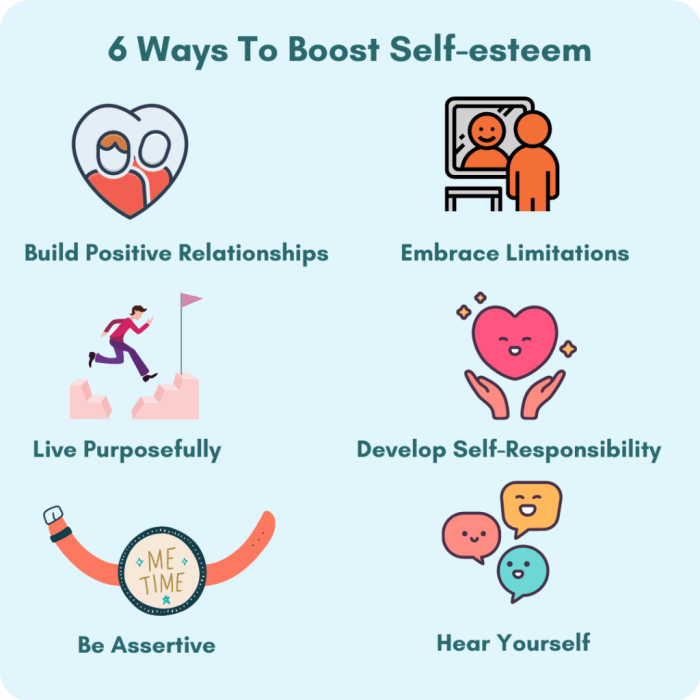
Meditation is a practice that involves focusing the mind on a particular object, thought, or activity to achieve mental clarity, emotional calmness, and a sense of inner peace. It is a technique that dates back thousands of years and has been used in various cultures and traditions as a tool for self-improvement.
Benefits of Meditation for Self-Esteem Improvement
- Meditation helps in reducing stress and anxiety, which are often linked to low self-esteem. By calming the mind and body, individuals can gain a better perspective on themselves and their abilities.
- It promotes self-awareness and mindfulness, allowing individuals to observe their thoughts and emotions without judgment. This awareness can lead to a deeper understanding of oneself and foster self-acceptance.
- Regular meditation practice can enhance feelings of gratitude, compassion, and kindness towards oneself, leading to a more positive self-image and increased self-esteem.
Why Meditation is a Valuable Tool for Boosting Self-Esteem
- Meditation cultivates a sense of inner peace and contentment, reducing the need for external validation and approval to feel good about oneself.
- It helps individuals develop a sense of resilience and emotional stability, enabling them to navigate challenges and setbacks with confidence and self-assurance.
- By fostering a connection to one’s inner self, meditation can uncover limiting beliefs and negative self-talk that contribute to low self-esteem, allowing individuals to replace them with more empowering beliefs and affirmations.
Understanding Self-Esteem
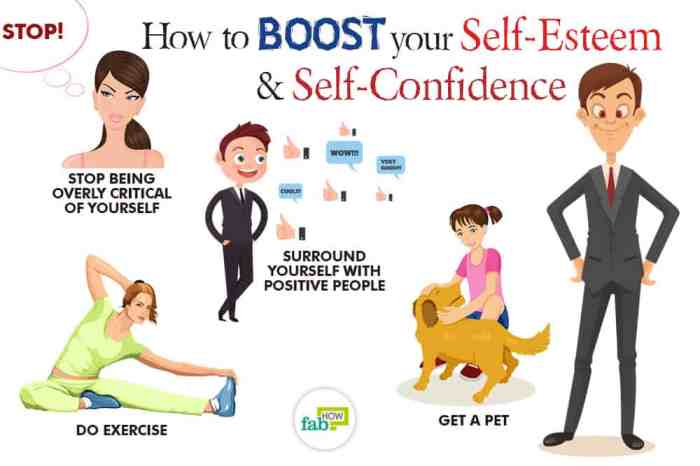
Self-esteem is the overall opinion we have about ourselves, encompassing our beliefs, emotions, and behaviors. It plays a crucial role in our mental well-being as it influences how we perceive and interact with the world around us.
Negative thoughts can be overwhelming, but meditation offers a way to overcome them. By practicing mindfulness and self-reflection, individuals can shift their mindset towards positivity. Explore 7 Ways to Use Meditation to Overcome Negative Thoughts for helpful strategies.
Importance of Self-Esteem in Mental Well-being
Self-esteem is essential for our mental health as it affects our confidence, resilience, and ability to cope with challenges. A healthy level of self-esteem allows us to set boundaries, make decisions, and pursue our goals with determination.
Procrastination can hinder productivity, but meditation can help overcome this obstacle. By cultivating focus and mental clarity, individuals can tackle tasks with efficiency. Learn more about how to meditate for overcoming procrastination at How to Meditate for Overcoming Procrastination.
- Self-esteem impacts how we handle stress and adversity, influencing our overall emotional resilience.
- Individuals with high self-esteem are more likely to have positive relationships and engage in self-care practices.
- Low self-esteem can lead to feelings of inadequacy, self-doubt, and difficulty in asserting oneself in various situations.
Factors Influencing Self-Esteem
Several factors can influence our self-esteem, including our upbringing, experiences, relationships, and societal expectations. Understanding these factors can help us identify areas for improvement and develop a healthier sense of self-worth.
In times of difficulty, finding inner peace can be a challenge. One effective way is through meditation. By practicing How to Meditate for Achieving Peace During Difficult Times , individuals can cultivate a sense of calmness amidst chaos. Additionally, meditation can also help overcome negative thoughts. By utilizing techniques outlined in 7 Ways to Use Meditation to Overcome Negative Thoughts , one can shift their mindset towards positivity.
Furthermore, for those struggling with procrastination, incorporating meditation practices from How to Meditate for Overcoming Procrastination can enhance focus and productivity.
Our self-esteem is shaped by internal beliefs we hold about ourselves and external feedback we receive from others.
- Childhood experiences, such as parental support and validation, can significantly impact the development of self-esteem.
- Comparing ourselves to others, seeking external validation, and facing criticism can lower our self-esteem.
- Successes, failures, and achievements can also influence how we perceive ourselves and our capabilities.
Connection Between Self-Esteem and Mental Health
Self-esteem and mental health are closely intertwined, with one affecting the other in a cyclical manner. Individuals with high self-esteem are more likely to experience positive mental health outcomes, while those with low self-esteem may be at risk for anxiety, depression, and other mental health issues.
- Positive self-esteem can act as a protective factor against mental health conditions, offering a sense of self-worth and confidence.
- Conversely, low self-esteem can contribute to feelings of worthlessness, hopelessness, and isolation, exacerbating mental health challenges.
- Therapeutic interventions, such as cognitive-behavioral therapy and mindfulness practices, can help improve self-esteem and promote better mental well-being.
Types of Meditation Practices
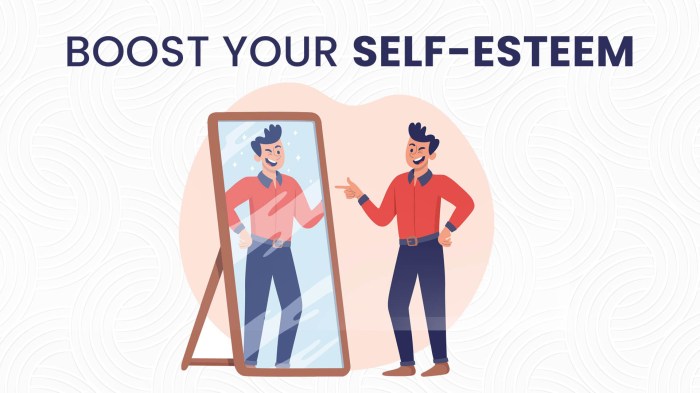
Meditation practices come in various forms, each offering unique benefits for boosting self-esteem. Let’s explore different types of meditation suitable for enhancing self-worth and confidence.
During difficult times, finding peace through meditation can be a powerful tool. By focusing on mindfulness and relaxation techniques, individuals can achieve a sense of calm and clarity. For a guide on how to meditate for achieving peace during challenging moments, check out How to Meditate for Achieving Peace During Difficult Times.
Mindfulness Meditation
- Mindfulness meditation involves focusing on the present moment without judgment, acknowledging thoughts and feelings as they arise.
- By cultivating awareness of one’s thoughts and emotions, individuals can develop a greater sense of self-acceptance and compassion.
- Practicing mindfulness meditation regularly can help individuals build resilience against negative self-talk and self-doubt, leading to an improved self-esteem.
Loving-Kindness Meditation
- Loving-kindness meditation, also known as Metta meditation, focuses on cultivating feelings of love, compassion, and kindness towards oneself and others.
- By extending feelings of warmth and goodwill towards oneself, individuals can foster a deeper sense of self-love and acceptance.
- This form of meditation can be particularly beneficial for those struggling with low self-esteem, as it promotes feelings of worthiness and belonging.
Guided Meditation Practices for Self-Worth, How to Meditate for Boosting Your Self-Esteem
- Guided meditations specifically designed to boost self-worth and confidence often utilize affirmations and visualizations to promote positive self-perception.
- These guided practices may include repeating affirming statements such as “I am enough” or visualizing oneself succeeding and feeling confident in various situations.
- By engaging in guided meditations focused on self-worth, individuals can reframe negative beliefs and cultivate a more empowering self-image.
Steps to Meditate for Enhancing Self-Esteem: How To Meditate For Boosting Your Self-Esteem
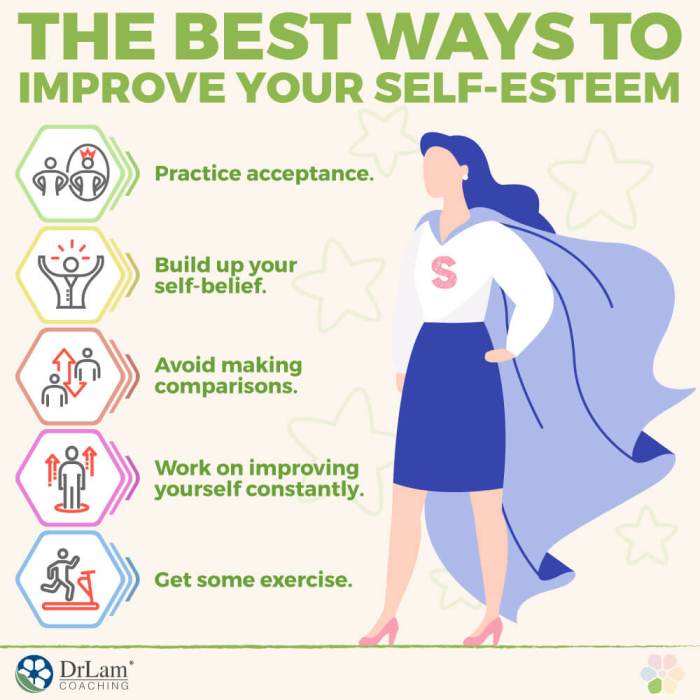
Starting a meditation practice can greatly improve self-esteem over time. Consistency is key in reaping the benefits of meditation for boosting self-esteem.
Creating a Conducive Meditation Environment
Before you begin your meditation practice, it’s essential to create a calming and peaceful environment that will help you focus and relax.
- A quiet and clutter-free space can help you avoid distractions.
- Dimming the lights or using candles can create a soothing atmosphere.
- Adding cushions or a comfortable chair can help you sit comfortably during meditation.
Step-by-Step Guide to Starting a Meditation Practice
- Choose a time: Select a time of day when you can meditate consistently, whether it’s in the morning, during a break, or before bed.
- Find a comfortable seated position: Sit comfortably with your back straight, either on a cushion on the floor or a chair.
- Focus on your breath: Take deep breaths in and out, focusing on the sensation of breathing.
- Set an intention: Reflect on positive affirmations or intentions to boost your self-esteem.
- Practice mindfulness: Be present in the moment, observing your thoughts without judgment.
- End with gratitude: Finish your meditation practice by expressing gratitude for yourself and your efforts.
Consistency in Meditation for Improved Self-Esteem
Consistency is key when it comes to seeing improvements in self-esteem through meditation. By practicing regularly, you can cultivate a sense of inner peace, self-acceptance, and self-love over time.
Consistent meditation can help you build a strong foundation of self-worth and confidence.
Mindfulness Techniques for Self-Esteem
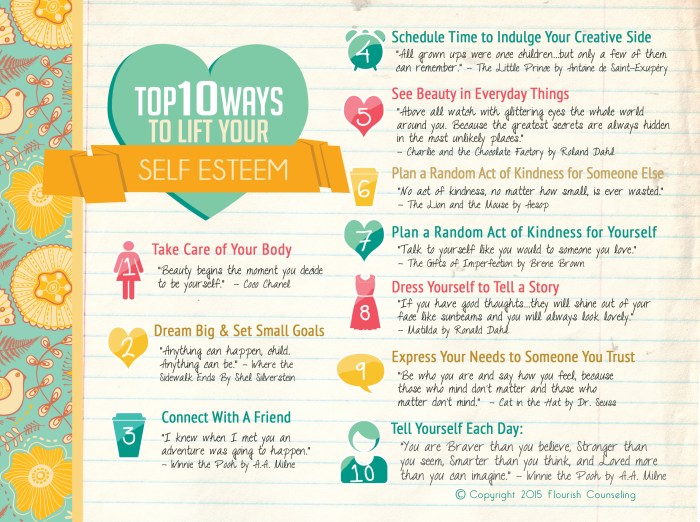
Mindfulness techniques play a crucial role in boosting self-esteem by helping individuals become more aware of their thoughts, feelings, and behaviors without judgment. This awareness allows for the recognition and acceptance of oneself, leading to a stronger sense of self-worth.
Practicing Self-Compassion in Mindfulness
- Self-compassion involves treating oneself with kindness, understanding, and acceptance, especially in moments of difficulty or failure. In mindfulness practices for self-esteem, self-compassion plays a vital role in cultivating a positive and nurturing relationship with oneself.
- By acknowledging and validating one’s emotions and experiences without self-criticism, individuals can develop a more compassionate and supportive inner dialogue, which can significantly impact their self-esteem.
- Practicing self-compassion in mindfulness involves extending the same care and empathy towards oneself as one would to a close friend facing challenges or setbacks.
Mindfulness Exercises for Enhancing Self-Worth
- Body Scan Meditation: This technique involves systematically focusing on different parts of the body, noticing sensations without judgment. By cultivating a non-judgmental awareness of the body, individuals can develop a deeper connection to themselves and their physical presence, promoting self-acceptance and self-esteem.
- Loving-Kindness Meditation: This practice involves sending wishes of well-being and happiness to oneself and others. By directing positive intentions towards oneself, individuals can foster feelings of self-love, compassion, and worthiness, which are essential for enhancing self-esteem.
- Silent Sitting Meditation: Simply sitting in stillness and observing the breath can help individuals become more present and attuned to their inner experiences. This practice promotes self-awareness and self-acceptance, laying the foundation for improved self-esteem.
Embark on a path of self-improvement and inner growth as you embrace the practice of meditation for boosting your self-esteem. Discover the profound impact of mindfulness on your mental well-being and unlock a newfound sense of self-appreciation through regular meditation sessions.